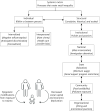Conceptualizing, Contextualizing, and Operationalizing Race in Quantitative Health Sciences Research
- PMID: 35045967
- PMCID: PMC8959750
- DOI: 10.1370/afm.2792
Conceptualizing, Contextualizing, and Operationalizing Race in Quantitative Health Sciences Research
Abstract
Differences in health outcomes across racial groups are among the most commonly reported findings in health disparities research. Often, these studies do not explicitly connect observed disparities to mechanisms of systemic racism that drive adverse health outcomes among racialized and other marginalized groups in the United States. Without this connection, investigators inadvertently support harmful narratives of biologic essentialism or cultural inferiority that pathologize racial identities and inhibit health equity. This paper outlines pitfalls in the conceptualization, contextualization, and operationalization of race in quantitative population health research and provides recommendations on how to appropriately engage in scientific inquiry aimed at understanding racial health inequities. Race should not be used as a measure of biologic difference, but rather as a proxy for exposure to systemic racism. Future studies should go beyond this proxy use and directly measure racism and its health impacts.VISUAL ABSTRACTAppeared as Annals "Online First" article.
Keywords: community/public health; disparity; epidemiology; inequity; intersectionality; race; racism.
© 2022 Annals of Family Medicine, Inc.
Figures
Comment in
-
New Consensus Report Recommends against the Use of Race in Genetic Research.Clin Chem. 2023 Aug 2;69(8):941-942. doi: 10.1093/clinchem/hvad076. Clin Chem. 2023. PMID: 37531562 No abstract available.
References
Publication types
MeSH terms
Grants and funding
LinkOut - more resources
Full Text Sources

